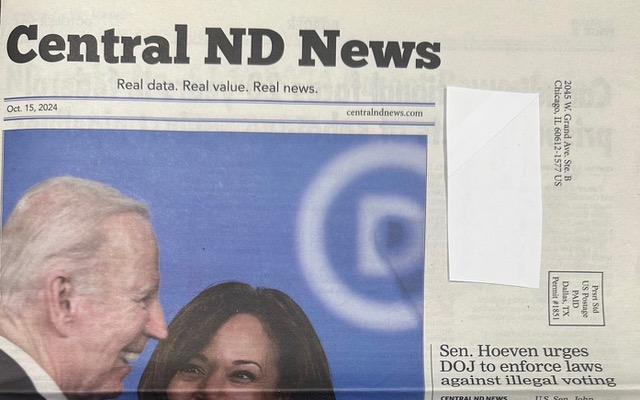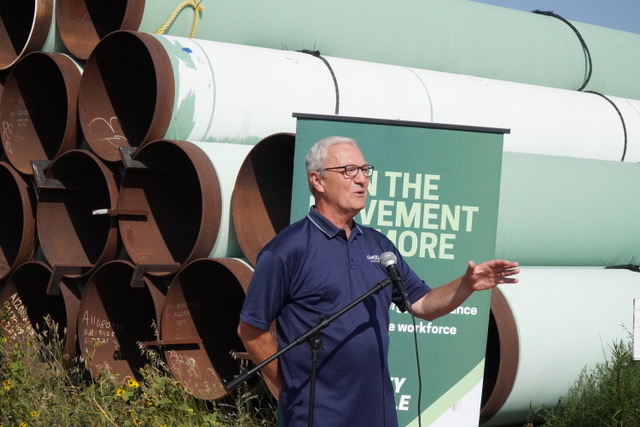Inspired by her grandparents, Tonah Fishinghawk-Chavez proves that caring for the community is an action, not just a word
‘Weird’ newspaper calls out DAPL pipeline protests eight years later
Publication appears in Morton County as Greenpeace trial looms
Michael Standaert & Miranda Green

These are pages from the Central ND News, a newspaper that showed up at North Dakotans’ homes purporting to provide local news. Instead, the paper is aimed at maligning protests of the Dakota Access Pipeline from eight years ago and boosting key Republican campaign talking points. (Lee Pedinoff / Floodlight)
The newspaper’s motto reads “Real data. Real value. Real news.” But there is nothing real about it.
The Central ND News has many of the hallmarks of a legitimate news source — headlines, infographics and 12 pages of newsprint. But the newspaper mailed to residents of one North Dakota county this October were uniformly right leaning, largely lacked bylines identifying the stories’ authors and in some instances had a clear target — the Dakota Access Pipeline protests.
The newspaper was postmarked from Chicago, Illinois and distributed to residents predominantly residing in Morton County, the community where the majority of anti-Dakota Access pipeline activity had occurred eight years before.

One headline read: “Canadian national faces 20 years in federal prison for acts of sabotage against pipelines.” The paper had a special section labeled “This Month in History October 2016” that highlighted articles including: “Area schools locked down as authorities respond to pipeline protests.”
Four other articles quote or feature U.S. Sen. Kevin Cramer (R-ND), highlighting his thoughts on President Donald Trump, inflation and gas prices — two key GOP talking points in the presidential election. Cramer is facing re-election on Nov. 5.
The Dakota Access Pipeline protests brought national attention to Morton County, which is known for its prime cattle grazing. Celebrities including Susan Sarandon and Shailene Woodley rallied with the Standing Rock Sioux tribal members who opposed the construction.
The pipeline was set to cross the Missouri River at the Lake Oahe reservoir, and the tribe feared it would contaminate their water supply and disrupt sacred sites. Others objected to the pipeline because it would further the United States’ reliance on fossil fuels, the major cause of climate change. Hundreds of people were arrested.

But the protests over the pipeline are old news. It’s been nearly a decade since President Barack Obama blocked the completion of the Dakota Access Pipeline and Trump quickly reversed course. It has been operating through North Dakota since May 2017.
Some residents who live adjacent to the river where the pipeline protesters camped eight years ago say the protests were disruptive. But many locals in other parts of Morton County say by and large they did not impact their daily lives. Today, they said, the controversy is a non-issue.
In February, the county is expected to be back in the limelight. This time it will be the site of a trial labeled the most consequential in North Dakota history — a $300 million lawsuit brought by the Texas-based company that owns the pipeline, Energy Transfer, filed against the environmental group Greenpeace.
Energy Transfer’s lawsuit, which also names Earth First! as a defendant, charges they are “rogue eco-terrorist groups” that engage in criminal activity and misinformation “to target legitimate companies and industries with fabricated environmental claims and other purported misconduct.”
Greenpeace USA disputes the claims and has characterized the lawsuit as a vehicle to silence criticism of the fossil fuel industry.
“While a judgment in that amount would have a profound impact on the Greenpeace entities in the U.S., and could include bankruptcy, Greenpeace is confident in its legal defense,” said Deepa Padmanabha, senior legal advisor at Greenpeace.
The Central ND News showed up as other partisan messaging attacking Greenpeace also appeared online, including a website and Facebook and Instagram advertisements that targeted the protests. Those efforts were funded by a dark money group supported by fossil-fuel interests. Locals see it as a coordinated effort to influence the community before the trial.
“To me, this is a freedom of speech case and freedom of association case,” said Sarah Vogel, a lawyer who has served as North Dakota Commissioner of Agriculture and an assistant attorney general. “As residents of a small state without a whole lot of power, we’d better be able to speak up. Who knows? I mean, this time, it’s Greenpeace, but who will it be next time? Who will it affect next time?”
A publication with a past
The Central ND News traces back to a partisan news network with a history of taking funding from fossil fuel interests to publish “news” to push their agenda.
Tax documents and business filings reviewed by Floodlight and The North Dakota News Cooperative show that the paper and its companion website are owned and operated by Metric Media, an Illinois-based company led by former TV reporter Brian Timpone.
Metric is part of an eight-company network operating more than 1,100 online local news sites. Its nonprofit arm has received $1.4 million from DonorsTrust, a dark-money group that received significant funding from Charles and David Koch, who made their fortune through investments in the fossil fuel industry. Tim Dunn, the CEO of a leading Texas oil and gas company has held a managerial role in the network.

Metric was responsible for several print newspapers distributed to residents’ doors in other states in the days and weeks before key elections. The company was also tied to issue-focused publications including the Ohio Energy Reporter, a newspaper sent to Knox County, Ohio, residents warning about a proposed solar farm this past spring. It’s been reported that Metric also engages in pay-to-play journalism.
“The pink slime Metric Media network has been tied to oil interests in Texas from the beginning,” said Anne Nelson, author of “Shadow Network: Media, Money and the Secret Hub of the Radical Right.”
“Their formula is to use talking points from the right wing of the Republican Party and business interests, especially fossil fuels, and then mix those in with hyperlocal news,” Nelson said. “It looks like the hometown newspapers that have been dying off, but it’s actually a propaganda arm of a political and economic operation.”
Cecile Wehrman, executive director of the North Dakota Newspaper Association, said the publication does not meet the definition of an official newspaper in North Dakota.
“What’s concerning is that it pulls some local statistics from various sources. It would appear this is an attempt to create the impression it is being produced locally,” Wehrman said.
Curious call leads to story
The stories inside the Central ND News cover a variety of topics from border security to school choice — but a closer look reveals some consistent themes. There’s a focus on inflation, high gas prices, the disruption of the years-ago protests and positive news about Energy Transfer, the company that owns the Dakota Access Pipeline.
Nearly all of the articles in the Central ND News have generic bylines listed as written by “staff.” The only story with a named author is about Energy Transfer.
The article, written by “C.D. Marsden,” focuses on a $5 million grant Energy Transfer gave University of Mary in Bismarck more than six years ago. While many Metric articles across the network use this byline, a Google search for C.D. Marsden returned no relevant results indicating it’s a real person.
Emails to Central ND News bounced back, and calls to Metric’s office in Chicago were not answered.
Tom Ackerman, the press contact for the University of Mary in Bismarck, said he was initially confused when a reporter reached out for comment because of how many years had passed since the company made the donation to the university’s engineering department.
“He made his request by sending a link to a KFYR-TV story done several years ago with questions referencing that event when we had our press conference,” Ackerman said. “So, all I did was e-mail him a few press releases that already had the answers to what he was looking for.”
Ackerman said the reporter who contacted him did not have the same name as the person whose byline was on the piece. The man who called him was Andy Nghiem. Online searches show he is a prolific writer for Metric Media outlets across the country. The email Nghiem used was from a company called Advantage Informatics, also owned by Timpone. Nghiem and Timpone did not respond to requests for comment.
Fossil fuel, GOP interests dominate Central ND News
North Dakota isn’t a swing state. In fact, it’s expected to uniformly vote Republican in all major races. Polls show Cramer has a 22% lead on his closest challenger. But Cramer is a main fixture of this pink slime publication, both in print and online.
In the print edition sent to residents, he’s quoted in a section alongside other Republicans raising questions about the national average for the price of gas today compared to when Trump was president — which dipped to $1.84 a gallon during lockdowns at the start of the COVID-19 pandemic.
Cramer said he doesn’t know who is behind the paper. But he doesn’t mind the coverage.

“I’ve never heard of it until you sent it,” he told The North Dakota News Cooperative. “It’s a very attractive paper, yeah, for a guy like me.”
Cramer has been a staunch supporter of the Dakota Access Pipeline and the now-abandoned and equally controversial Keystone XL pipeline. Last summer he was featured in a press conference in front of remnants of the canceled pipeline that the campaign called a “boneyard.”
The event was put on by Americans for Prosperity, which is part of a network of dark money groups linked to Charles and David Koch. The support for Americans for Prosperity was a big 180-degree turn for the candidate, who in 2018 lost the political backing from the political action group for being “inconsistent” on Koch network issues.
This campaign, Cramer received $7,500 in donations from the Koch Industries PAC. He’s also taken $60,000 in donations from Texas-based Energy Transfer — roughly $40,000 in direct donations and $10,000 each to two PACs affiliated with his campaign.
Koch Inc., Energy Transfer and Crownquest Operating — the company founded by Metric Media-linked billionaire Tim Dunn — are the top three oil and gas companies donating to the 2024 election cycle. Together they spent $89 million to benefit mostly conservative candidates for president, Senate and the House of Representatives.
Cramer said he has no interactions with the PACs that raise money for his Senate campaign. He said he doesn’t know who is responsible for the articles that feature him. Yet Cramer can see how the paper can be effective.
“I don’t mind this sort of thing. I do wish, though, that there was some sort of a disclosure or transparency. We’ve all used newspapers for (campaign advertising),” he said. “I’d rather send out a newspaper-looking piece of literature or propaganda than a glossy postcard, for example. It’s just all peculiar to me, but I kind of applaud it, if it’s all legal.”
During the height of the Dakota Access pipeline protests in 2016 and 2017, the action centered on the sparsely populated part of the county bordering the Standing Rock Reservation. The contentious protests were highlighted by the heavy use of police activity. The governor called in the National Guard and the federal government sent in dozens of officers from the National Park Service and Fish and Wildlife departments to assist.
Estimates by state officials said the protests cost the state $38 million. In 2019, North Dakota sued the U.S. government to recoup the costs. That trial concluded in March, but the judge has yet to announce a verdict.
Company files SLAPP suit
Since the protests, Energy Transfer and its subsidiary Dakota Access LLC have donated millions to nearby towns for library improvements and first-responder training. In 2017, the company donated $15 million to the North Dakota Department of Emergency Services to pay down the costs of responding to pipeline protests.
That same year, Energy Transfer filed its lawsuit against Greenpeace for its role in the protests.
It’s considered a SLAPP suit — a strategic lawsuit against public participation — which protesters say is used to silence and intimidate them through costly legal proceedings. North Dakota has no laws banning such suits. News organizations and individual journalists can use anti-SLAPP statutes to protect themselves from groundless defamation cases brought by subjects of stories.

This October, The Standing Rock Sioux Tribe filed a new lawsuit against the U.S. Army Corps of Engineers, arguing that the pipeline is illegally operating and should be shut down.
The next day, the Central ND News landed in residents’ mailboxes.
New websites and advertisements also have popped up maligning the Dakota Access Pipeline protests and attacking Greenpeace.
A website for the “Pipeline Protection Project” says it’s “committed to exposing the truth about green activist groups such as Greenpeace USA, who excuse violence and vandalism under the guise of ‘free speech.’ ”
The website is backed by a group called the American Energy Alliance, whose parent company has taken funding from Koch-backed nonprofits Donors Trust and the Charles Koch Institute. Both groups are run by a former lobbyist for Koch Industries.
In October, American Energy Alliance spent $2,000 on Facebook and Instagram ads that promoted an article from a right-leaning publication, The Daily Caller News Foundation, with a headline that labeled Greenpeace activists “Spoiled Brats.”
Leier said she’s concerned about the use of a newspaper that looks legitimate but is “kind of swindling the rural people a little bit” and “putting something out there that’s not real.”
She added, “It had been awhile since I’d thought about (the protests.) So many other things have happened in our world since then, like the pandemic. You forget about it until something prompts you to remember.”
Floodlight is a nonprofit newsroom that investigates the powerful interests stalling climate action.The North Dakota News Cooperative is a nonprofit news organization providing reliable and independent reporting on issues and events that impact the lives of North Dakotans. The organization increases the public’s access to quality journalism and advances news literacy across the state. For more information about NDNC or to make a charitable contribution, please visit newscoopnd.org. Send comments, suggestions or tips to michael@newscoopnd.org. Follow us on Twitter: https://twitter.com/NDNewsCoop.
External
Indigenous participation may be highest in the climate conference’s history
Dramatic play reveals power of Indigenous stories and community
Thousands peacefully protest
At an oak savannah near Eugene, Oregon, TEIP interns and elders carry forward a time-honored tradition, restoring meadow health and renewing relationship with the land
UTTC International Powwow attendees share their rules for a fun and considerate event






